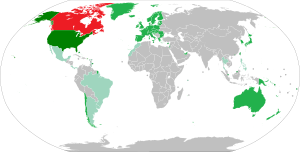2023/Attendance/Travel
If you are interested in the upcoming WikiConference North America, please ensure you are looking at the current conference site.

Toronto — 9-12 November 2023
| Home | Program | Attendance | More |
|---|---|---|---|
Toronto is the capital city of the Canadian province of Ontario. The Greater Toronto Area, commonly referred to as the GTA, had a 2021 population of 6,712,341. The city is an international centre of business, finance, arts, sports and culture, and is recognized as one of the most multicultural and cosmopolitan cities in the world.
Getting in
Citizens of the US, Mexico and some Caribbean countries do not require visa to enter Canada. Consult the Government of Canada website if you need to apply a visitor visa. For those that do not require a visa to visit Canada, you will need to apply for Electronic Travel Authorization (eTA) in advance if you are flying into a Canadian airport. While U.S. citizens do not require eTA, they must bring a valid US passport when entering Canada.By plane
The main airport is Toronto Pearson International Airport (YYZ) in Mississauga, served by most major international carriers in North America. You can get to downtown Toronto by UP Express train, by a combination of local bus plus subway or by taxi.
The secondary airport is Billy Bishop Toronto City Centre Airport (YTZ). It is located in downtown Toronto along the waterfront but its destinations are limited to short-haul locations in Canada (Halifax, Montreal, Ottawa, Thunder Bay and others) and the US (Boston, Chicago, New York and Washington, D.C.).
There are other peripheral airports like Hamilton International Airport (YHM) and Kitchener/Waterloo Airport (YKF) that are served mainly by low-cost carriers. However, they are much further away from Toronto and require multiple public transit transfers.
By train
VIA Rail runs multiple train trips daily along the Windsor-Quebec City corridor.
Amtrak runs the Maple Leaf Train between New York City and Toronto, with stops at Niagara Falls, Buffalo and Albany.
The NYC→Toronto Wiki-Train is a special discounted group trip that arrives on Wednesday November 8, in time for the GLAM Culture Crawl. There will also be a return group trip on Monday November 13.
All trains stop at Union Station in the heart of downtown Toronto.
By bus
Bus companies such as Rider Express, FlixBus and Megabus operate bus routes from Niagara Falls, Windsor and Ottawa (and towns/cities in between) to Toronto. In addition, FlixBus and Megabus have routes from New York City to Toronto.
By car
You can drive to Toronto. It is about a 2-hour drive from Buffalo and about 5-hour drive from Detroit (not including time spent at the border).
Weather in Toronto
Average daytime temperatures in November are about 4 °C (40 °F). Temperatures between 7.6 °C (45.7 °F) and -0.2 °C (31.6 °F) are relatively common. There is a good chance of sun, though fall in Ontario also feature rain (on about an average of 11 days) and snow (3 days). Toronto's temperature is generally more temperate and humid than GTA due to its proximity to Lake Ontario. Proper clothing and footwear will keep you warm and from slipping on ice.
Though the summer solstice will have passed almost two months earlier, the sun usually rises at about 7:00 a.m. and sets at 5:00 p.m.
Canadian dollar
All Canadian banks provide currency exchange at the daily market value.[1] In some areas, private exchange bureaus will give better exchange rates and lower fees than banks. So if you have time during your travels to look one up, it might save you some money on the exchange both when you arrive and before you leave, because Canadian dollars may not be worth as much in your home country. Some hotels, souvenir shops and tourist offices exchange money, but their rates won't put a smile on your dial. Many places in Toronto accept US dollars for small transactions – with a rough 1:1 exchange rate – and it is advised to obtain some Canadian dollars if you will use cash. US coins are often mixed in with Canadian coins at stores since they are similar in appearance.
The USD-CAD exchange rate as of May 2023 has an average of 1.35 USD=1 CAD in 2023.[1]
Electricity plugs
Electrical plugs are the same throughout North America, usually 100–127 volts / 60 Hz, type A-B (NEMA connectors). If you are from a region outside of North or Central America, you may need an adapter. You can easily find these devices at any electronics store in Toronto.
Most airports, train stations, bus stations and hotels offer free access to electricity, either through normal electrical outlets or USB outlets. It is also common to have access to outlets in cafes and restaurants.
Since most of the electricity generated in Ontario is from hydro renewable sources, many public places offer free access to electricity.
Internet access
If you have a mobile phone, tablet or computer that uses the cellular network, make sure your carrier's plan is appropriate for roaming in Canada. Fees may apply depending on your mobile plan.
Wi-Fi access in downtown Toronto is widespread and generally free; most public places have Wi-Fi hotspots, but you may need the password. You can visit towifi.ca and find a list of the places where hotpots are available (not necessarily up to date).
- Notes and references
- ↑ 1.0 1.1 The exchange rate is an approximation as of May 2023. For an updated rate, visit Google finance website.

